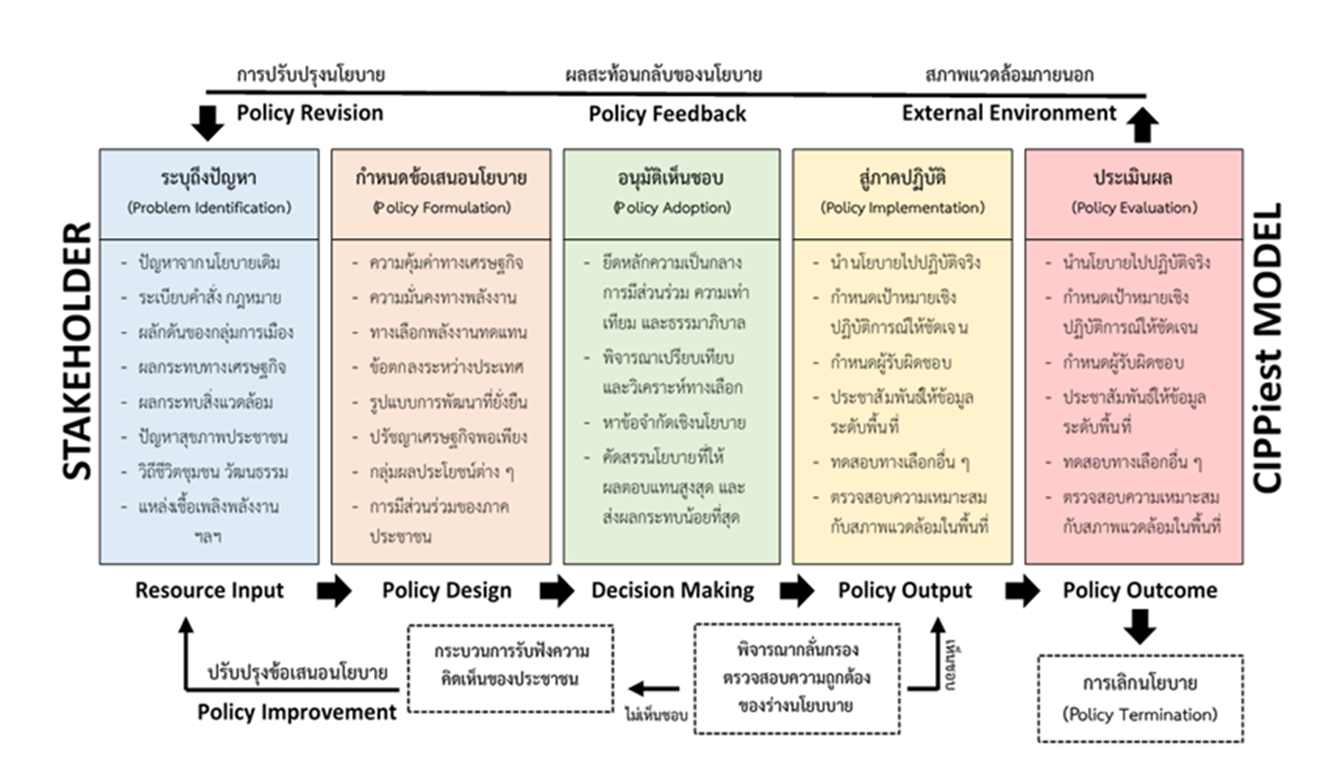CRITICAL DISCOURSE ANALYSIS FOR NATIONAL ENERGY DEVELOPMENT POLICY: A CASE STUDY OF COAL POWER PLANT IN KRABI-THEPA
Main Article Content
Abstract
The objectives of the research article were 1) to analyze conflicts over the practice of the government’s energy policy, using a critical discourse framework2) to propose a management guideline and the proper energy policy formulation. This is qualitative research that utilized critical theory-based research, including in-depth interviews and observations of policymakers, villagers, the public sector, and general academicians with 18 persons as well as independent organizations. This research was conducted for 1 year and 11 months.
The results of the study showed that: 1. there are conflicts, specifically related to environmental and people’s health effects. These reflect the power of policy and practice that do not match the facts in the area. 2. Under a community relocation condition affects a person's emotion, feeling, or thinking. It has also a direct impact on wetlands, generally include the integrity of mangrove forests. 3. Alternative energy should be established by the government's energy policy, according to the Sustainable Development Goals. There are still restrictions on the rules. 4. There is a need to balance economic development with environmental and ecological conservation. The Krabi and Thepha coal power plant construction project has been developed over many years with a social breaking point, based on the strong disagreement raised by the community. Each party establishes its own thought and opinion regarding the different reasons. The protestor, therefore, entered into a factual finding that was not just for their own group, this makes Thailand's energy agenda.
Article Details

This work is licensed under a Creative Commons Attribution-NonCommercial-NoDerivatives 4.0 International License.
References
กรมพัฒนาพลังงานทดแทนและอนุรักษ์พลังงาน กระทรวงพลังงาน. (2563). แผนพัฒนาพลังงานทดแทนและพลังงานทางเลือก พ.ศ.2561-2580. สืบค้นเมื่อ 15 ตุลาคม 2563. จาก https:// www.dede.go.th/download/Plan_62/20201021_TIEB_AEDP2018.pdf
กรมส่งเสริมคุณภาพสิ่งแวดล้อม กระทรวงทรัพยากรธรรมชาติและสิ่งแวดล้อม. (2563). ความตกลงปารีส (Paris Agreement). สืบค้นเมื่อ 17 ตุลาคม 2563. จาก https://www.deqp. go.th/ new/B8%AA-paris-agreement
กรมอนามัย กระทรวงสาธารณสุข. (2555). แนวทางการประเมินผลกระทบต่อสุขภาพโครงการโรงไฟฟ้า. นนทบุรี : กองประเมินผลกระทบต่อสุขภาพ กรมอนามัย กระทรวงสาธารณสุข.
กระทรวงต่างประเทศ. (2558). ถ้อยแถลงนายกรัฐมนตรีในการประชุม UN Sustainable Development Summit 2015 วันที่ 27 กันยายน 2558 ณ สำนักงานใหญ่สหประชาชาติ นครนิวยอร์ก. สืบค้นเมื่อ 17 ตุลาคม 2563. จาก http://m.mfa.go.th/main/th/media-center/28/60617
กระทรวงทรัพยากรธรรมชาติและสิ่งแวดล้อม. (2553). ความรู้เบื้องต้นเกี่ยวกับพิธีสารโตเกียว. กรุงเทพมหานคร : สำนักงานนโยบายและแผนทรัพยากรธรรมชาติและสิ่งแวดล้อม กระทรวงทรัพยากรธรรมชาติและสิ่งแวดล้อม.
กรีนพีซ. (2551). ถ่านหิน มหันตภัยโลกร้อนหมายเลขหนึ่ง. กรุงเทพมหานคร : กรีนพีซ.
กรีนพีซ. (2558). ต้นทุนชีวิตโรงไฟฟ้าถ่านหินกับภัยคุกคามต่อสุขภาพของคนไทย. กรุงเทพมหานคร : กรีนพีซ.
กรีนพีซ. (2561). รายงาน Krabi Goes Green : สู่เมืองต้นแบบพลังงานหมุนเวียนเกินร้อย. กรุงเทพมหานคร : กรีนพีซ.
การไฟฟ้าฝ่ายผลิตแห่งประเทศไทย. (2558). โครงการโรงไฟฟ้าถ่านหินกระบี่. นนทบุรี : ฝ่ายสื่อสารองค์การ การไฟฟ้าฝ่ายผลิตแห่งประเทศไทย.
การไฟฟ้าฝ่ายผลิตแห่งประเทศไทย. (2558). ทุกคำถามมีคำตอบโครงการโรงไฟฟ้าถ่านหินเทพาและท่าเทียบเรือสำหรับโรงไฟฟ้าถ่านหินเทพา. นนทบุรี : ฝ่ายสื่อสารองค์การ การไฟฟ้าฝ่ายผลิตแห่งประเทศไทย.
การไฟฟ้าฝ่ายผลิตแห่งประเทศไทย. (2558). รายงานผลการปฏิบัติตามมาตรการป้องกันและแก้ไขผลกระทบสิ่งแวดล้อมและมาตรการติดตามตรวจสอบผลกระทบสิ่งแวดล้อมโรงไฟฟ้าพลังความร้อนกระบี่อำเภอเหนือคลองจังหวัดกระบี่. นนทบุรี : ฝ่ายสื่อสารองค์การการไฟฟ้าฝ่ายผลิตแห่งประเทศไทย.
การไฟฟ้าฝ่ายผลิตแห่งประเทศไทย. (2559). แผนพัฒนากำลังผลิตไฟฟ้า (Power Development Plan : PDP2015) ในช่วงปี พ.ศ.2558-2579. นนทบุรี : การไฟฟ้าฝ่ายผลิตแห่งประเทศไทย.
จังหวัดกระบี่. (2557). วิสัยทัศน์กระบี่ ปี 2020. สืบค้นเมื่อ 15 ตุลาคม 2563. จาก http://www. krabi.go.th/krabi2015/m_file/KrabiVision2020.pdf
ชาตรี เพ็ญศรี. (2543). วาทกรรมการพัฒนาของรัฐไทย : พ.ศ. 2504-2539. กรุงเทพมหานคร : สำนักพิมพ์จุฬาลงกรณ์มหาวิทยาลัย.
นาตยา แท่นนิล. (2555). รูปแบบของกระบวนการนโยบายสาธารณะแบบมีส่วนร่วมในการจัดการเกษตรและอาหารปลอดภัยในจังหวัดสงขลา. วิทยานิพนธ์ปรัชญาดุษฎีบัณฑิต สาขาวิชาการจัดการสิ่งแวดล้อม. คณะการจัดการสิ่งแวดล้อม : มหาวิทยาลัยสงขลานครินทร์.
บุญรอด สัจจกุลนุกิจ และคณะ. (2556). รายงานวิจัยฉบับสมบูรณ์ โครงการศึกษาจัดทำแผนที่นำทางและศักยภาพในการวิจัย และพัฒนาเทคโนโลยีถ่านหินสะอาดในภาคอุตสาหกรรมของประเทศไทย. กรุงเทพมหานคร : สำนักงานคณะกรรมการส่งเสริมวิทยาศาสตร์ วิจัย และนวัตกรรม.
ประชาชาติธุรกิจ. (2561). “นิด้า” คว้าศึกษา SEA โรงไฟฟ้าถ่านหินกระบี่-เทพา ธ.ค.นี้. สืบค้นเมื่อ 19 ตุลาคม 2563. จาก https://www.prachachat.net/economy/news-252596
โพสต์ทูเดย์. (2556). กรีนพีชเผยโรงไฟฟ้าถ่านหินคุกคามระบบนิเวศ. สืบค้นเมื่อ 19 ตุลาคม 2563. จาก https://www.posttoday.com/social/general/212769
สัญญา เคณาภูมิ. (2559). กรอบแนวคิดการศึกษานโยบายสาธารณะ. วารสารวิชาการและวิจัยสังคมศาสตร์ มหาวิทยาลัยราชภัฏนครสวรรค์. 11(33). 43-68.
สามชาย ศรีสันต์. (2559). วาทกรรมแนววิพากษ์และการศึกษาการพัฒนาในสังคมไทย. วารสารสำนักบัณฑิตอาสาสมัคร. 13(1). 261-293.
Greenpeace. (2018). Renewable Energy Job Creation in Thailand. Bangkok : Greenpeace.
International Energy Agency. (2010). Power Generation from Coal: Measuring and Reporting Efficiency Performance and Carbon Dioxide Emissions. Paris : IEA Coal Industry Advisory Board.
Stufflebeam,D.L.&Shinkfield, A. J. (2007). Evaluation: Theory, Models and Applications. San Francisco : Jossey-Bass.
United Nations Development Programme. (2021). What are the Sustainable Development Goals?. Retrieved 15 October 2020. From https://www.undp.org/sustainable-development-goals


